|
The arrival of New Year’s Day often brings with it resolutions, goals, and new words or phrases that help us try to shape the next 365 days before us. Things like healthy eating, stricter budgets, more time spent in prayer, and increased amounts of exercise define our drives for self-improvement. We give extra time to turn our focus inward to make ourselves stronger, smarter, holier, and healthier. In an attempt to change our lifestyles, we might separate ourselves from our previous habits, relationships, or preferences so that we can sharpen our focus even more on self-growth. We hone our discipline and increase our self-reliance in the name of improvement. In the new year, our focus is often inward. While this inward focus isn’t harmful in itself, we might find ourselves stuck in our self-reliance. Now that a few weeks into the new year have passed, many of those resolutions, goals, and mantras might have faded into the background of post-holiday life. At this point, many of us have lapsed in our new practices, or we might have abandoned our resolutions altogether. We might find ourselves isolated in the new patterns we have picked up or starting to flounder due to a lack of support. Even though our New Year’s resolutions may have been made with the best or holiest of intentions, we might find ourselves failing without others to encourage us, support us, or hold us accountable. While the new year is the time when our focus is inward, the weeks soon after, when our discipline begins to wane, give us cause to lean outward. What would it look like to lean outward in our resolutions in the weeks ahead by seeking others to help us carry them out? Why might allowing ourselves to be helped by others and accompanied by them lead us to a more meaningful and spiritually significant pursuit of our resolutions? Though as Catholics we frequently hear about accompaniment in a context of explicitly spiritual progression, its fruitfulness is still applicable in non-explicitly spiritual goals in an informal sense. As the final document from the Synod on Young People, the Faith, and Vocational Discernment reminds us, “accompaniment cannot limit itself to the path of spiritual growth and to the practices of the Christian life” (Final Synod Document, 94). Accompaniment can help us experience transformation in many areas of our lives in addition to our spiritual life, as it “fosters growth in holiness through everyday circumstances and interests” (The Art of Accompaniment, 15). Though on the surface it may look like simply reaching out for the help of a friend, seeking out accompaniment to help us carry out our New Year’s resolutions has a deep theological and spiritual significance. Accompaniment is a form of “bear[ing] one another’s burdens [in order to] fulfill the law of Christ” (Galatians 6:2). When we seek another’s help to bear our burdens, experiences, hopes, and challenges, we open ourselves up to be in communion with someone else; we profess that we were created by God out of love, to love, and to be loved by others. Accompaniment is a simple way by which we actively remember that “The LORD God said: It is not good for the man to be alone” (Genesis 2:18). When we seek the help of another, we affirm the beauty of being human: we’re not meant to live life completely on our own effort and initiative. Having a good listener, mentor, or friends helps us to turn our inward focus in our resolutions outward. We no longer remain alone in our efforts, strivings, or discipline. The support of another trusted person helps us remain steadfast in our resolution to be healthier, spend more responsibly, or love more generously. This support can take the form of a quick text from an accountability partner to check in on our progress, or a weekly meet-up with a mentor to discuss our challenges. Similarly, we can seek more formal relationships of accompaniment to help meet our goals. Beginning a relationship with a therapist might help us explore more deeply our relationship with others or just as seeking the help of a personal trainer might allow us to have the added accountability to eat more nutritiously or get physically fit. Relying on others in the pursuit of transforming ourselves reminds us of the beautiful gift of being human: as human beings, we can have a profound effect on one another in providing support, love, and encouragement in growing into the people God has destined us to be. Whether sought out in a formal or informal sense, accompaniment challenges us to let ourselves be loved by others in the simplicity and complexity of our everyday life. Allowing ourselves to be supported by others, even in something as simple as our New Year’s resolutions, reveals the deep significance of others to our vocation to holiness.
0 Comments
12/19/2019 Look Up, Set Out, and Give: Learning from Mary, the Magi, and the Shepherds this Advent SeasonRead Now“The Virgin today brings into the world the Eternal / And the earth offers a cave to the Inaccessible. / The angels and shepherds praise him / And the magi advance with the star, / For you are born for us, Little Child, God eternal!” (CCC525) The quote from the Catechism above references three key players I want to reflect upon at the beginning of this Advent season: Our Lady, the magi, and the shepherds. Today, as we think about the meaning of waiting and watching, upon preparing for Christmas and for the return of the Lord, we can look to these three examples to show us how to look up, set out, and give. First: It’s important to start off with an understanding of Advent as a liturgical time of waiting and preparation. I’ve often heard that God has three responses to our prayers: yes, no, or wait—wait being our least favorite of the three. “Wait” seems so indefinite. With a yes or no response, you know, for better or worse, one way or another, what your parameters are. But “wait” requires faith, trust, humility. It requires not knowing exactly when, exactly how, or exactly if. And that’s one lesson this season can impart: waiting well, waiting in hope. During Advent, we recall the waiting of the world for the birth of the Messiah. The greatest gift from God the Father, the gift of his Son, is coming to us. And in this world which has experienced his coming, we also wait for him to come again. Each of us awaits something. Perhaps we await a promotion. The completion of a degree. Maybe we long for a spouse or a child. Physical or emotional healing. The answer to our vocational discernment. In this time of waiting, we are like the Israelites wandering in the desert in pursuit of the Promised Land. It’s there--the Promised Land is there. God is faithful and keeps his promises. But sometimes, we have to wait. Waiting practically forces us to surrender control and hand everything over to God. It’s a daily practice in humility and faith. It acknowledges that we are not in control and challenges us to trust in the goodness of the One who is. Therefore, waiting has a purpose, an end: God Himself. And, as with the Israelites in the desert sustained by the descent of manna from heaven, we are fed daily by God himself IF we allow ourselves to be. This means speaking and listening to God in prayer. It means collecting the manna from above, his grace, DAILY. And this brings us to our first point about the Advent season: we need to look up and see. Mary knew what it meant to look up in prayer. She was so receptive to the word of God that she conceived it through the power of the Holy Spirit. She was looking up in prayer when the Angel Gabriel announced the Good News of the Messiah. Her response? “Let it be done unto me according to your word.” These were the words of trust, surrender, and peace--followed by action—the second of our themes today. She looked up and set out in order to give. Immediately after the Annunciation, we read about her going out to help her cousin Elizabeth. As someone who has experienced the first trimester of pregnancy twice now, I can tell you the last thing I’m thinking about during that time is helping or serving others. I’m usually passed out somewhere trying not to drool. But Mary has looked up, set out, and given. She was so receptive to God’s word that she was able to fully encounter his message through the Angel Gabriel. Her reception of Christ caused her to set out in haste to see Elizabeth. And finally, to give and serve another by bringing Christ into that home and modeling sacrificial love. Mary is the perfect example of waiting and being guided by God. In Scripture, she is described as “pondering things in her heart”—waiting for God to reveal his will and meditating on his work throughout her life. But she is not one who sits on the sideline and fails to engage. She is a contemplative in action—one who treasures the word of God within her (even literally) and yet immediately goes out to Elizabeth in her time of need. Mary brings Jesus to others, from the moment of his conception, wherever she goes and instructs us to “do whatever he tells you,” as at the wedding feast in Cana. We turn to Mary during this season of Advent because she is an expert at faithful waiting that leads to Christ. So I invite you as we continue our Advent journey to start by spending time with the Blessed Virgin Mary. Re-read the account of the Annunciation and Visitation in Scripture. Ask her help in waiting—faithfully, hopefully, humbly. And invite her to accompany, guide, and prepare you to receive Christ. She always leads others to her Son. In addition to the example of Mary, the magi can also teach us what it means to wait in hopeful anticipation: to look up and see the star, To set out, To give freely. The magi, though Gentiles, were not complacent, but so observant that they were able to recognize God’s sign: the star. As Pope Francis said, “The Magi were not content with just getting by, with keeping afloat. They understood that to truly live, we need a lofty goal and we need to keep looking up.” What keeps us this Advent from looking up and seeing the star? Are we busy scrolling through our social media feeds, binging on the latest Netflix series, working late hours at the office, or anxious about the future? Are we paralyzed by grief, bitterness, anger or fear? The magi were vigilant, ready to go when the time came. And their hearts were receptive, disposed to the signs of the times. Like Mary, they too set out on a journey which would lead them to Christ himself. This journey required effort, planning, and sacrifice. They looked up, set out, and finally, they gave: bearing costly gifts of gold, frankincense, and myrrh. They met the generosity of God by reciprocating generosity. As Pope Francis has also noted, “To give freely, for the Lord’s sake, without expecting anything in return: this is the sure sign that we have found Jesus.” Finally, we can also look to the example of the shepherds. Pope Francis says, “They were the first because they were among the last, the outcast. And they were the first because they were awake, keeping watch in the night, guarding their flocks.” The shepherds were looking up. After receiving the good news from the angel of the Lord, they go in haste to encounter Christ. And afterwards, they return glorifying and praising God. In each of these examples, we encounter people who are looking up, setting out, and giving. Mary sets out and gives her time and energy to serve her cousin Elizabeth. The magi set out and give gifts of gold, frankincense, and myrrh. The shepherds set out and give Christ their adoration and praise. Will we keep watch in the night alongside the shepherds or are we asleep with the rest of crowded Bethlehem, too distracted by our daily lives and concerns to notice the light of the star beaming down on the light of the world? As we await God’s response in our lives, do we grumble in the desert like the Israelites? Do we take things into our own hands and craft a golden calf? Or do we say to the Lord, “Let it be done unto me according to your word?” This season, will we set out in haste to give our hearts to the Lord and our hands to serve those in need? Perhaps what’s holding us back from entering into the Advent season is something more than distraction, ignorance, or noise. We may hesitate to meet this Christ-child because we feel as the shepherds most likely did, utterly unworthy. We wear the rags of sin, the stench of humanity. Maybe we feel like the little drummer boy in the popular song who says, “I have no gift to bring that’s fit to give a king.” In his humility, the Lord entered into the most vulnerable of human states: infancy. He chose to become little in order to demonstrate that all are able and invited to approach him. As Pope Francis also reminds us, “Jesus allows himself to be found by those who seek him, but to find him we need to get up and go.” So let’s get up and go. There is still time to look for the star, to set out, to give. I invite you to draw close to Mary, look to the example of the magi, spend time with the shepherds. In looking for Christ, encountering him, and serving others, we find Christ born also in our hearts. Only then, as the Catechism says, “when Christ is formed in us will the mystery of Christmas be fulfilled” (CCC526). Let us pray, “I want to come to Bethlehem, Lord, because there you await me. I want to realize that you, lying in a manger, are the bread of my life. I need the tender fragrance of your love so that I, in turn, can be bread broken for the world. Take me upon your shoulders, Good Shepherd; loved by you, I will be able to love my brothers and sisters and to take them by the hand. Then it will be Christmas, when I can say to you: “Lord you know everything; you know that I love you” (cf. Jn 21:17)." -Pope Francis “Jesus bent down and began to write on the ground with his finger.” - John 8:1-11
During this fifth week of Lent we are reminded that Jesus’ calm heart of contemplation should be our guide in strengthening our dependence on Him, allowing us to minister with renewed and clear hearts. As I read today’s Gospel, I was drawn not to his words or the main plot points that unfold, but rather I found my heart gravitate most towards this line: “Jesus bent down and began to write on the ground with his finger.” I’m sure I’m not alone in what comes to mind when I think about the legacy of Jesus: turning water into wine, walking on water, healing the sick...my mind never lands on this action of lowering himself to the ground and drawing in the dirt with his fingers. He stops in his tracks, undoubtedly with everyone around Him holding their breath for His response to the scribes and Pharisees, and he takes the time for discernment, for contemplation. I imagine him allowing the spirit to surround Him and aid Him in this moment of being tested, strengthening Him to release the words of His father: the words of justice and love towards a woman who, like all of us, is more than the worst thing she has ever done. Through contemplation and discernment we are made strong in our God, we are more clearly able to see the path of justice. We are able to withstand the tests and temptations so that we might fix our eyes on seeing God alive in those in front of us. As Lent comes to a close, let’s choose to kneel down and take pauses to invite God in to each moment that we might always minister from a place of contemplation. Focus: Community Can you imagine what our world would look like if we brought more contemplation into our relationships and our communities? If we allowed ourselves to be completely vulnerable and invite others to lean on us the way Jesus invites us into his embrace? To me this sounds a lot like the kingdom we so often talk about. I invite you to reflect on how you can weave contemplation not just into your own personal prayer life, but into your interactions to those you are closest to and still others you can invite into community. Prayer This Lenten season, may we doodle on napkins, choose the longer way home, find a quiet corner in our day, for we believe that when we ponder your mystery, you reveal glimpses to our hearts. May we turn down the radio, set aside the distractions of screens and bright lights, for we trust that in the silence you will speak loudest. May we kneel down to the ground, write with our fingers in the dirt, and allow the spirit room to transform our hearts into cathedrals of more perfect love. Who Inspires You To Serve? To me so much of embracing mission is learning about the local culture and people who have shaped the place God has sent me. Guatemala had arguably one of the most brutal civil wars in the region, lasting 36 years. Amidst the violence, an Indigenous Quiche Mayan woman, Rigoberta Menchú, worked against the brutal Guatemalan government and army on behalf of the rights of Indigenous peoples. Despite losing many family members to the genocidal violence, the Catholic faith being manipulated to tell Indigenous Mayan people to accept their poverty and persecution, and being exiled from her home country, her renewal in liberation theology and the strength of the Lord set her feet on a path of justice to fight for the human dignity of her people. Through continued contemplation, may we all find our hearts moved to not just long for, but to seek justice. This reflection comes from our 2019 Lenten Reflection Guide, a collaborative effort between the Catholic Apostolate Center and Catholic Volunteer Network. Click here to view the entire guide with reflections for each week of the Lenten season. Becky Kreidler, Franciscan Mission Service “Jesus returned from the Jordan and was led by the Spirit into the desert for forty days, to be tempted by the devil...” - Luke 4:1-13
In each of the Church’s Liturgical Seasons we have an opportunity to examine ourselves and reflect on different aspects of Jesus’s life. During Lent we create a space to reflect on His suffering and sacrifices. In today’s Gospel reading the Spirit led Jesus into the desert. For forty days Jesus lived in the wilderness, and faced the devil’s temptations. He was tempted with pride, power, and popularity; however, Jesus knew that He was called to follow God’s will and resist the empty promises the devil offered. I find comfort that the Holy Spirit led Jesus into the trial. The forty days were meant to prepare Jesus for the work that was to come, and a part of that preparation included temptations. Jesus relied on His knowledge of the scriptures and combatted the temptations with Truth. Turning a stone into bread seems like an innocent action, but Jesus knew that the temporary satisfaction would be empty and in defiance of God’s will. Jesus understands what it means to face temptation, and in His resistance provides a model of following God’s will that we should all ascribe to. Jesus was tested, and responded without sin. When I find myself facing a trial, I can draw comfort in the knowledge that the same Holy Spirit that led Jesus into the wilderness is in me. In His resistance in the wilderness, we have a foretaste of Jesus’s victory to come. At Easter we celebrate Jesus’s victory over death; in the meantime Lent provides us with a time to fast and prepare our hearts for the inevitable temptations of the world. Lent provides us with the opportunity to spend forty days in our own “wilderness”, fortifying our own hearts through sacrifice and prayer. FOCUS: COMMUNITY Throughout Lent we focus on all that Jesus has done for us. In today's Gospel we see that Jesus resisted each temptation, not just for Himself, but for us. Each of the temptations the devil proposed were designed to distract Jesus from His humanity. Each temptation involved Jesus using His divinity for personal gain and separating Himself from the human community. The temptation of individualism is something that we are all called to resist. The Lord created us as social beings with a responsibility to care for one another. WHO INSPIRES YOU TO SERVE? My Mom has always been a model of service I aspire to follow. She embodies the principle of placing others first, stressing to me and my siblings that “where your treasure is your heart will also be.” Mom’s treasure is rooted in the love she has for our community, and it is important to her that she actively invests her time to show the love. It could be as simple as caring for our school garden, or as involved as organizing our Church’s homeless outreach ministry. Mom has always found a way to make time for the causes that matter to her, and in doing so has shown the importance of committing time and resources to love others in her care for all of God’s Creation. PRAYER: Lord, you created us to love and worship. Help me cling to the truth that I am Yours in the midst of trials. When I walk through the valleys help me remember the joys from the mountain tops, and place my hope in the knowledge that Your will is for my good. Stir in me a heart that longs to discern Your will. Help me to work Your justice rather than personal gain every day of my life. Bless our bodies for Your service, and our service for Your Glory. To view the entire 2019 Lenten Guide, please click here. For more Lenten resources, please click here. Mara Scarbrough, Bon Secours Volunteer Ministry Lent is fast approaching. Ash Wednesday will arrive with the usual crowds to mark its beginning. Even though it is not a holy day of obligation, many Catholics feel the need to participate in a Mass or service and have ashes imparted upon them. Several of the same, even if they do not go to Mass on a regular basis, will take up the various Lenten disciplines of prayer, fasting, and almsgiving, but particularly fasting in the form of “giving up” something. It is important to consider that there is something stirring spiritually within these brothers and sisters. Those who are very active in the life of faith can either dismiss them or accompany them into deeper life in Christ, in and through his Church. How? By using well the tools of Lent – prayer, fasting, and almsgiving – as ways in which we can witness Christ more authentically to our brothers and sisters and deepen our encounter with him. In his Lenten message last year, Pope Francis made this invitation once again, “Above all, I urge the members of the Church to take up the Lenten journey with enthusiasm, sustained by almsgiving, fasting and prayer. If, at times, the flame of charity seems to die in our own hearts, know that this is never the case in the heart of God! He constantly gives us a chance to begin loving anew.” (2018 Lenten Message) The “enthusiasm” that comes from prayer, fasting, and almsgiving, is not of our own making. It is the work of God and one in which we cooperate. The disciplines of Lent are not ends in themselves. They are means to an end, greater communion with Jesus Christ. We are challenged by these practices to focus our attention not on ourselves, but more fully on God and neighbor. A focus on our neighbor returns us to those who are spiritually searching and arrive on Ash Wednesday or “give something up” for Lent. It means less attention on ourselves and more prayer for them, uniting our fasting with and for them, and giving of our time to them, especially to listen and accompany them back into living more deeply the life of faith. Not an easy task, but a sacrifice that, if lived well and authentically, could assist others in coming to Easter joy! May the Charity of Christ urge us on! For resources to accompany you throughout the Lenten season, please click here. “Prepare the way of the Lord, make straight his paths.” - Luke 3:1-6
REFLECTION Isaiah, whose words the evangelist Luke repeats in this week’s Gospel, prophesized a beautifully uncanny world. According to the prophet’s vision, no valley would be too deep, no mountain or hill too high, no road too long or path too rough for God’s salvation to reach. When we understand this word, we recognize that the saving presence of God has no limitation. God’s revelation arrives everywhere and to all life wherever it may be. No one life stands below or above another in that radically horizontal and unfamiliar world. God disregards human hierarchies, borders, and definitions. This season, we celebrate, meditate upon, and commit ourselves to our world’s greatest mystery—God incarnate and among us in Christ. Just like those along the Jordan who were invited by John the Baptist, we are invited to work for the world to which Christ, the salvation of God, arrived. The world in which we recognize God is with us and in each one of us. The world whose mystery we know capable to reveal itself anywhere and at any moment of the day. The world in which each person enters in community without prejudice or judgement but with mutual respect because we know every person to be equally chosen and beloved by God. FOCUS: Simple Living When I reflect on what prevents us from treating each other as kin and caring for each other and our common home, indifference appears as our greatest challenge. Today our politicians run campaigns based on hatred, prejudice, and the blatant disrespect of other cultures. Today so many of us deny scientific facts and disregard how our planet is suffering while we choose to continue to live numb and blind. Preoccupied primarily by our economic wellbeing, we tolerate injustice and accept apathy. Simple living this Advent must mean making space for God and others in our hearts by ridding our lives of the material goods which make us apathetic to and complicit in others’ suffering. PRAYER Just and compassionate God, whose incarnate word reveals itself to the tender and humble hearted, we pray for healing from the hurtful divisions that human hierarchies, borders, and definitions impose. Send your Spirit to renew a world divided and suffering. May bigotry shake in the path of Your love and prejudice fade in Your understanding presence. You, good guardian, know each one of us to be Your chosen and beloved. Bless and protect us as we work for reconciliation, peace, and justice. SERVICE SUGGESTION Opening our hearts to the arrival of God begins with an honest reflection on what in our lives encourages our cultural indifference to the suffering of our planet and its most marginalized peoples. This Advent, think of the moral demands of our faith and analyze whether your life habits or practices adequately demonstrate your commitment to God, all God’s people, and all God’s creation. What will you do to reflect more of the light of Christ today? **This reflection is from the 2018 Advent Reflection Guide, a collaborative effort between the Catholic Apostolate Center and Catholic Volunteer Network. To see the whole guide, please click here. Kevin Ruano, Franciscan Mission Service DC Service Corps A second wind is often an unexpected gift. Whether it is discovered during a run, study session, or some other activity demanding intense focus and effort, what at first seems daunting and impossible to achieve suddenly becomes possible thanks to newfound strength and endurance. A second wind, while surely appreciated physically or mentally, can also be applied spiritually. As the Church celebrates her birthday on Pentecost Sunday, we can reflect on the incredible gift of the Holy Spirit who was sent by God Himself to provide the fledgling Christian faith a much needed second wind as apostles prepared to bring the Good News of Christ to the entire world.
One of the Gospel readings for Pentecost details our Lord’s promise to send the Holy Spirit to His disciples. In an earlier related chapter from John’s gospel, Christ Himself walks with the disciples and predicts His own Passion. He assures the disciples that they will not be abandoned as orphans, but will share in the very life of the Most Holy Trinity (John 14:15-31)! The consolation and comfort Jesus brought to those gathered in the Upper Room after His death and resurrection surely reminded them of this though He ordered them to not leave Jerusalem until “the promise of the Father” had been sent (John 20:19-23). It would not be until after Christ’s ascension, that the Holy Spirit would be sent upon the disciples and so enable them to carry out the Great Commission of our Lord, “Go therefore and make disciples of all nations, baptizing them in the name of the Father and of the Son and of the Holy Spirit, and teaching them to obey everything that I have commanded you.” While Christ had sent out the disciples to evangelize before (see Luke 10:1-20, cf. Matthew 10), these efforts were limited to “the lost sheep of the house of Israel.” Proselytizing the rest of the world would take place after the rejection of our Lord and would require grace to sustain the disciples through this incredible evangelical endeavor. Today, the faithful are not only entrusted with this mission, but have also been baptized and confirmed with the same Holy Spirit as was promised to Christ’s first followers! The Holy Spirit is truly God and is inseparable from the Father and the Son. Though Christ is seen, it is the Spirit who reveals Him. Thus, both are on a “joint mission” to reveal the visible image of the invisible God (see CCC 689). The Holy Spirit invites us to better know the Father and Son. Each person of the Trinity more fully deepens our understanding of God. As the Catechism says: Now God’s Spirit, who reveals God, makes known to us Christ, his Word, his living Utterance, but the Spirit does not speak of himself. The Spirit who “has spoken through the prophets” makes us hear the Father’s Word, but we do not hear the Spirit himself. We know him only in the movement by which he reveals the Word to us and disposes us to welcome him in faith. The Spirit of truth who “unveils” Christ to us “will not speak on his own.” (CCC 687) The Holy Spirit continuously reveals Christ to us when we make an effort to listen. Similarly, when we recognize and cooperate with the Holy Spirit dwelling within us, we are better able to contemplate Christ’s teachings and the great Mysteries of Faith. When we face discouragement or are unsure of a decision we must make, we are in similar circumstances to those waiting in the Upper Room. The gifts of the Holy Spirit strengthen our faith and helps us to judge our situations prudently. The courage to continue Christ’s mission and not be defeated by discouragement or rejection is not only an incredible witness to the Church, but also a recognition that the Holy Spirit continues to work among us wherever we are in our journey of faith! Just as the Holy Spirit descended upon our Lord at His baptism to start His mission on earth, so too did Christ send the Holy Spirit upon the disciples in the Upper Room as they began their ministry. Like the disciples, let us dare to be open to the Holy Spirit’s activity in our daily lives as a much needed second wind as we continue our Lord’s work so that at the end of our days, we may hear spoken to us, “Well done, my good and faithful servant ... Come, share your master’s joy.” Question for Reflection: Can you recall a moment when the Holy Spirit gave you the courage to continue through a difficult trial? “I am the resurrection and the life, says the Lord; whoever believes in me, even if he dies, will never die.”
Today’s Gospel challenged my understanding of what it means to be compassionate. When Jesus learned that a loved one was ill, He responded in a peculiar manner. He didn’t rush to the sick one’s side or hurry to comfort His beloved’s family. Rather, He waited two days. Why did He wait two days? I sure wouldn’t have done that. If He knew all along that He would raise Lazarus, why would He prolong the wounded agony of Mary and Martha? How could Jesus desert those He loved in their moment of need? It seems almost like a test, a cruel and unnecessary test. Yet I suspect Jesus had a different intention. By waiting two extra days He was not punishing or testing Mary and Martha but inviting them to examine their own brokenness. The idea of resting in brokenness, rather than avoiding it, has been a particularly challenging concept for me. I first encountered it in Bryan Stevenson’s book Just Mercy, in which Stevenson says “We can embrace our humanness, which means embracing our broken natures and the compassion that remains our best hope for healing. Or we can deny our brokenness, forswear compassion, and, as a result, deny our own humanity.” It seems that Jesus chose the former. When He finally arrived in Bethany and witnessed the woundedness of those He loved, He “became perturbed and deeply troubled.” Then, “Jesus wept.” Knowing that Jesus wept helps me reclaim my own brokenness and affirms that truly embodying compassion requires entering into the chaos of woundedness, both my own and that of the “other” person. Prayer: God of grace, help me rest in my woundedness. When I feel most alone and deserted, remind me of Jesus’ constant refrain “Do not be afraid.” Help me remember that Jesus Himself, the almighty Son of God, wept for the pain of His community. Let me never forget that one of Jesus’ greatest miracles of raising Lazarus from the dead was precipitated by His solidarity in suffering with those He loved dearly. Amen. Focus on: Social Justice How have you been wounded by the, as Dr. Martin Luther King Jr. puts it, “sickness of racism, excessive materialism, and militarism?” How can you – and your surrounding communities – enter into this brokenness and encounter healing compassion? Service Inspiration: My mother, Sue, understands part of my volunteer experience, but struggles with other components. However, I recently babysat for a colleague’s children, a two-and-a-half year old and a six-month old. When I left, I was exhausted. I realized later that I watched two boys the same age difference as my brother and I, but only for a few hours. My mom did it for years, and then became my teacher and homeschooled us. She served as an enormous role model, never asking for thanks or recognition, silently taking on her children’s struggles. She is an inspiration and reminder of Jesus here on Earth. *This Lenten reflection was originally published on the Catholic Volunteer Network Blog and was posted with permission. Greg Hamilton attended Saint Michael’s College in the grace-filled Green Mountain State of Vermont and is currently serving as a Jesuit Volunteer in Washington D.C. at the Campaign for the Fair Sentencing of Youth. Most days, Greg finds a way to involve his favorite poet, Mary Oliver, in his routine. I recently came back from a summer vacation to England and Scotland. Whenever friends and family have asked about my favorite part of the trip, I always say the Scottish Highlands and English Lake District. The beauty of the tall mountains with peaks hidden in the clouds and covered in the brightest green foliage takes your breath away. Peering up at these magnificent stone crags with my head tilted back to face the sky, I couldn’t help but mutter a continuous, “Wow!” The first thought that entered my head was the lyric from the song “Shoulders” by the Christian band For King and Country: I look up to the mountains / Does my strength come from the mountains? / No, my strength comes from God / Who made heaven, and earth, and the mountains. The entirety of my trip, I saw God in simple things – a sunny day without rain, swans and ducks swimming in ponds, the architecture of a beautiful church, sheep and cows grazing in fields, fellow tourists greeting me with a funny story and smile. It took a plane ride across the Atlantic for me to become refreshed and remember to purposefully think about God’s presence in all things, no matter how ordinary the moment may be. After my trip, I thought about several ways in which I can continue to find God in everyday life.
For more resources on Laudato Si', please click here. How is your posture? Whether I’m teaching a relaxation and scripture meditation class, aerobics, floor and core work, strength and balance, or working one-on-one with an individual, I am constantly reminding my students to, “check in with your posture.” Are your feet firmly planted in the ground? Are you engaging your thighs? Is your pelvis tilted under and your spine lengthened? Is your core engaged? Are your shoulders rolled down and back? Is your head and neck lifted? Where is your focus? I’m sure that any of my students will tell you that, at first, it is slightly unnerving to hear constantly. Soon, however, we each come to realize what an important role proper posture plays, not only in our everyday lives, but especially during our exercises. The simplest of movements can be made more challenging and more beneficial for the whole body and mind by engaging and practicing proper posture. Through the effort of involving the whole body, we are able to improve our balance, kinesthetic awareness, and better focus on isolating the specific muscles that we are moving or working. When we are able to unite that kind of movement awareness with the sacrifice of an intention or prayer, powerful things can happen within and through us. Although it is hard to believe, we are just about half way through our Lenten journey. It’s time to check in with our spiritual posture. Are we engaging our Lenten spiritual muscles of prayer, fasting, and almsgiving? Is our human pride tucked under and our humility engaged? Are our shoulders rolled back and our head held high during our offerings of sacrifice so as not to draw attention to our sacrificial efforts? (Matthew 6:5-8) Or are we simply going through the motions, executing the exercise, without engaging our whole selves? We are all called to be saints within our own right. Becoming a saint and bringing the glory of God and the saving power of Christ into the world is what we were created to do. That is our Eastertide. That is what we are “training” for. Lent is not meant to be business as usual. Therefore, our spiritual posture becomes even more relevant and important as we challenge, exercise, and train ourselves for what we are called to be. There may be times in our lives where going through the motions is necessary. Sometimes, it may be all we can do—and that’s okay. However, Lent is our time to persevere. Lent is our training season. What do we need to remove from our lives to reach a healthier state spiritually, emotionally, mentally, and physically? What are the things we need to hang onto or strengthen in order to reach our Easter goal? As we assess our journey thus far, perhaps we can call upon the assistance and intercession of St. Katherine Drexel as we honor her on her Feast Day today. Saint Katherine Drexel beautifully expresses that our entire being and all that we do, from work to play, to keeping ourselves healthy, should be offered back to our heavenly Father for His glory. For it is only through Him that we receive our spirit and our faculties. It is through Him and our offerings to Him that we receive the strength and ability to complete the work that He calls us to and to become the saints we are called to be. In her personal writings, she prayed: “Yes, my Lord and my God Jesus, to you I commend my spirit, my soul with its faculties, my body with its senses, my heart with its affections, all that I have, and all that I am. Dispose of me absolutely, in everything, according to your will. From now on, dearest Jesus, may everything outside you be a matter of indifference to me, provided only I accomplish your will and advance in your love. O Jesus, I love you and your Mother and abandon myself to your love for time and eternity.” Check in with your posture. Do the hard work and don’t be afraid to sweat your way through the rest of Lent. Unite your work, your dedication, and your sacrifices with the saints and angels and call on their intersession for strength. Stay focused on the end result, the finish line, the Easter joy. For more resources to help your spiritual Lenten posture, click here. Children have a way of shedding light on a question or topic we hadn’t thought of or paid much attention to. Suddenly, a topic they might casually bring up becomes extremely important and sends us into a research frenzy in search of the correct answer. A few weeks ago, a coworker shared stories about her young children with me, some of which included teaching them lessons about God. Her son asked why we pray for others if God knows the outcome. While discussing prayer and God’s omniscience with my coworker, I dug deep down in my memory to recall catechism lessons from Catholic grade school. I shared some answers with my coworker, but felt the need to consult my parish priest for further insight. Ultimately, I understood that prayer deepens our relationship with God. My parish priest proposed the alternative: “If we never needed to pray, we would never think of God. We would forget him and our relationship with him would atrophy, if not entirely disappear.” Jesus tells us to pray as he prayed. James 4:3 says, “You ask but do not receive, because you ask wrongly, to spend it on your passions.” And in somewhat of a response, John 16:24 says, “Until now you have not asked anything in my name; ask and you will receive, so that your joy may be complete.” As we pray, our desires can become purified. Perhaps we begin praying for “x” outcome, and as we pray, we come to realize “x” is not the best option and instead we are called to “y”. Prayer serves to change us. While God is omniscient, omnipotent, and omnipresent, he has also provided us with free will. We must pray and discern which choices lead us to follow God’s plan. As St. Thomas Aquinas says in his work Summa Theologica, “We pray, not that we may change the Divine disposition, but that we may impetrate that which God has disposed to be fulfilled by our prayers...” (Pg. 3492) Praying for others is a way of loving them. Prayer for others allows us to grow in compassion and keeps us from focusing on selfish concerns. The Catechism of the Catholic Church states that even since Abraham’s time, people have interceded (asking on behalf of another) in prayer for one another. It is a “characteristic of the heart attuned to God’s mercy.” (CCC 2635) Intercession for our fellow man is an act of selflessness, even to the point of praying for our enemies. “The intercession of Christians recognizes no boundaries, ‘for all men, for kings and all who are in high positions,’ for persecutors, for the salvation of those who reject the Gospel.” (CCC 2636) Sometimes we can be God’s instrument by providing comfort or assistance to a community member in need when we learn of or are asked to pray for someone. We can become God’s answer to a prayer. While we do not know why God may grant one prayer and not another, it’s important to know God loves us and desires what is best for us. And being in a close relationship with God is best for us. As my parish priest said: “the ‘stuff’ God grants is secondary.” For more resources on prayer, please visit the Catholic Apostolate Center Prayer and Catechesis Resource page. 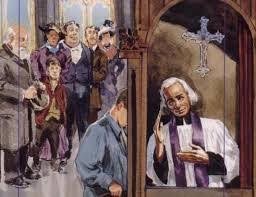 Every interaction, every conversation, each and every dive into our relational natures as human beings begins with the willing openness to listen. Listening begins with a simple opening, a knock on the door of our self-focus that lets us know that someone else is here, present before us with a unique existence, one that should be experienced and embraced. Listening happens in almost everything we do in our daily lives, whether we are speaking with others, learning instructions, praying, or even sitting alone in the quiet of an empty house. There is always something to hear, always something to experience. To listen is to see the beauty and worth in another and embrace this by joining another in his or her own life’s journey, wherever they may be, in whatever they are going through. I often say that listening is an art. We are all great artisans of speech, one way or another. Whether outspoken and personable, or soft-spoken and shy, we all have an inner preacher within us that constantly narrates our thoughts, opinions, and daily lives. To speak is in our nature, and to listen is also a part of who we are. Speaking, however, often seems easier than listening. Children, constantly having to be reminded to give each person his turn to speak, exemplify this. Why is it hard to listen? I think the life of Saint John Marie Vianney, whose feast we celebrate today, can show us some answers. Looking into his life, one can see just how important and powerful the art of listening is for us all. Listening is something that can be appreciated in others and within ourselves in an almost artistic way, such as when we read the great sonnets of Shakespeare, or admire Monet’s Water Lilies. Listening has its own beauty within it, as all things do. It is in itself a beautiful thing. Saint John Vianney, I believe, knew the power that listening wields. As a priest in the farmlands of France, traveling around to spiritually devastated towns, he would plop himself down in a confessional and just sit there, waiting. In time, townspeople started coming and speaking to him. He heard confessions for long lengths of time each day, listening to the needs of the people of France. Slowly and surely, each town he visited began beaming with a light and a warmth that didn't exist before. Besides hearing the townspeople’s confessions, John Vianney validated and embraced their lives in his own, welcoming all and listening with an open heart. He embraced fully the priesthood as a way to listen to others, to join into the community of all, to embrace and see the worth in others and to let others know that Christ sees their worth as well. He did this through devout prayer to God and a humble heart to listen to God’s plan for him. It is by this profound listening that John Vianney became the well-known Patron of Priests that he is today. John Vianney teaches us that listening can save lives. Regardless of how small a conversation may be, to listen is to embrace another, to shine forth that spirit of community that builds the foundation for the One, Holy, Catholic, and Apostolic Church. Each and every person has something to say and is worth the time. Vianney also teaches us to listen to God, to listen to the silence we so often get in response to our prayers that the answer is there, in our life. God listens to us always, in everything we do; all we need to do is learn to embrace ourselves the way God embraces us when He listens to our lives. As we continue on our journeys, I pray that the art of listening may inspire and shine beautifully in our interactions with others each day and in our prayers to the Almighty Father. William Clemens is a Undergraduate Student of Theology & Religious Studies at The Catholic University of America in Washington, D.C.
Let’s face it, trudging along in our daily lives can be dull sometimes. One must try, even if the thought is just a curious leap of the soul, to remove oneself from the business of the world and to look up at the sky. We must look up in the sky toward a marvelous sight, the light that propels life on this earth, the face of the creation, and the Creator of beauty.
In all areas of darkness, light abounds brighter than ever. In all things, we exist and share in our lives with our Creator. Everything we do is profound in its own small way. Everything that happens, happens with and for a purpose, with and for a cause, ever meaningful and ever present in our lives. Our lives are living, never truly dying. We will always have the light to look toward. The hope that always lets us know we are never truly alone in anything we do. We must rise into the light in this very moment. This is what the fires of Pentecost are about. We must remember to put action into the journey of the disciple in sharing the truth and love of God in the world. It is waiting for the passions of our own lives to pass and form into one focus of love, pure and true. We are waiting for love, preparing for love, being there for love, attending to love, sacrificing for love, yet we must always remember that we ARE Love. We, as beautiful reflections of the heart of God can illuminate the darkness not only in our own lives, but in others as well. We can be beacons of light, shining bright for others to see. Light is what draws us to the Heavens on a day with a clear sky. It is what makes us wonder at the millions of stars bursting in radiance in the night. It is what can illuminate any darkness no matter how small the flame may be. The light we see in the Sacraments passing from Christ into His people is nothing short of a miracle. The light we witness on the Cross, expelling all sin and darkness from our twisted up hearts, brings us closer to the very nature of love, the deepest kind of love, the love of Christ. In Him I see my guiding Light and my strength to carry on each and every day of my life. He is my starlight in the dark of the sky, letting me gaze of his majesty. In everything, there is light. It is truly present infinitely in our universe. There is a place for us in the skies with the Father, for we, in this world, will rise a stronger people, ready to take up the mission of light, the mission of love, and the mission of hope for all who are searching for something, anything that can fulfill a restless heart. William Clemens is an Undergraduate Student of Theology & Religious Studies at The Catholic University of America in Washington, D.C. Be sure to check out Pope Francis' latest encyclical, Laudauto Si, and visit the Catholic Apostolate Center's Laudato Si Resource Page! 9/25/2014 Discernment Story: How one volunteer came to hear her life calling through serviceRead NowI believe that my two years of service had a 100% direct impact on my discernment process and decision to enter the Daughters of Mary Help of Christians, more commonly known as the Salesian Sisters of St. John Bosco or just the Salesian Sisters. In fact, I would go so far as to say that God sent me to volunteer at this particular High School to reveal my vocation.
I wanted to do a year of volunteer service right out of high school, but did not have the opportunity to do so. I learned that I found great joy in serving others through my social outreach group in high school and had a strong desire to give more time, energy, and direct focus to volunteering. Come April of my senior year in college, I found myself without a plan for the following year and the idea of doing a year of service re-entered my mind. I visited theCatholic Volunteer Network website and found the online RESPONSE directory,which helped me to narrow down my search to the type of program I was interested in with the type of support that I needed. This is where I learned about the Cristo Rey Network of schools and truly the next chapter of my life began. The Cristo Rey Network is a high school model that offers low income families the opportunity to send their students to Catholic college prep high schools. How is this possible when most Catholic high schools are quite expensive, you might ask. The school partners with local corporate businesses, organizations, universities, hospitals, law firms etc where the students will work five days out of the month to offset their tuition cost. (Click here to learn more and see me in my classroom at minute 4:37.) It took a leap of faith to go to Don Bosco Cristo Rey High School (DBCR) in Washington, D.C. because I would be joining the Salesian Domestic Volunteers (now called Salesian Home Missioners) in their first year as a volunteer program and I would also be the only volunteer placed at DBCR. I was going to be a pioneer both in my volunteer program and placement in the school. DBCR was also only in its fourth year of existence and still responding to the challenges of being in the “start up” period. It would be two years of learning and growing for all of us. During my first year of service at Don Bosco Cristo Rey High School I worked in the Youth Ministry and Faith Formation Department while also teaching two sections of junior theology. In my second year I taught a full course load, five sections, split between freshmen and junior theology as well as assisting the youth ministry team. Within those classrooms and the small youth ministry office God called me to be a Salesian Sister. I learned a lot from working side by side with Fr. Abraham Feliciano, SDB (Salesians of Don Bosco). In him, I witnessed the everyday charism of the Salesians and joyful service to the young who are most in need. Fr. Abe loved those students with his whole heart and they knew it. They knew that they could rely on him to crack a joke and brighten their day or that they could come to him with serious problems and he would lead them to Jesus. I learned that the heart of the Salesian charism is a daily encounter with Christ in and through our students and hopefully reciprocated as we open ourselves to be an image of Christ for them. I spent countless afternoons in that youth ministry office, surrounded by young people, laughing so hard I thought I would burst! I also learned how to be with them in and through the struggles they encountered in their daily lives. (Click here to see the class of 2014 reading excepts from MLK Jr.’s “Letter from Birmingham Jail”. These are some of the many students who have overcome great challenges in their live and that I had the privilege to see Christ in everyday. ) While working with these students, I lived in community with volunteers from several different programs. We were a mixed bag of Franciscans, Salesians (that’s me!), Columbans, and volunteers from the Catholic Volunteer Network. Over the course of my two years there we ranged from a community as small as four to as large as nine. The Franciscan style of living in community is simplicity. On an economic level, we made do with all second hand furniture and shopped frugally for our needs. We usually did not buy Ziploc bags, for instance, because we could reuse Tupperware containers instead. As a part of my volunteer program, I did not have a car but I received a stipend each month for food and transportation. On the community level, simplicity meant that we relied on each other. Sometimes that took the form of practical matters, such as grocery shopping or mopping up a flood in the basement. Other times it took a more personal form as we relied on one another for support and friendship. Now that I am living in community with the Salesian Sisters, I look back on my time in community as a formative period. In learning how to live with different people of various personalities, I learned how to recognize the gifts that all members can bring to community and I was able to learn more about myself as well. As my two years of volunteering came to a close, I decided to stay and accepted a full time paid teaching position at DBCR. But I had an inclination, even then, that God was calling me to something more, something deeper. God had gifted me with two wonderful and difficult years at the service of a school and students truly in need. But His ultimate goal was not for me to stay at one school and with one group of students, He wanted to expand my horizons of service and the dimensions of my heart. I had the opportunity, while Fr. Abe was at DBCR, to attend daily Mass in our school chapel. This daily encounter with Christ in the Eucharist helped me to see Christ every day in the young people and opened my heart for the possibility of deeper relationship with Him. When the Salesian Sisters came for our vocations assembly I heard God’s voice speaking directly to me saying, “This is it!” I must be honest, my first reaction was irritation. “Oh very funny God! Here I am sitting through the same vocation talk presented to all five of my Theology classes. Aren’t you supposed to be speaking to the students right now?! Leave me alone!” But because our God is good and patient, He didn’t leave me alone. After three years in Washington, D.C., He called me to move to New Jersey where the formation house of the Salesian Sisters is located. It took some convincing on God’s part to show me that it was not just DBCR where He wanted me to serve, but anywhere the Salesians are and with all young people tho whom He might send to me. The Salesian Sisters dedicate their whole selves to God in the service of young people through education, parish catechism, youth centers, and anywhere young people may be found. St. John Bosco and St. Mary Mazzarello (our founders) shared the joy of Christ with every young person they met providing for them a home to feel welcome, a school to prepare them for life, a Church to evangelize, and a playground for them to make friends and have fun! For me, what started as just a year of service post college opened the doors of my heart for Christ to call me to my life’s vocation. I am now half way through my first year of formation and if I had to identify one overriding emotion, it would be deep a sense of peace. For more information on vocations, be sure to check out the Catholic Apostolate Center's Vocational Discernment Resources Kelly Schuster is a former Salesian Home Missioner and is currently an Aspirant with the Salesian Sisters This post was originally written and posted on the Catholic Volunteer Network Blog. For more Catholic Volunteer Blog Posts please visit the CVN Blog Page. The Catholic Apostolate Center is proud to partner with the Catholic Volunteer Network by developing faith formation resources for volunteers and alumni, assisting in its efforts to provide and advocate for faith-based volunteerism and collaborate in many additional ways. Lent is a time of reflecting on how to better ourselves in our relationships with our friends, our family, and our God, as well as a time to reach out to those less fortunate than us and show them the love of Christ. Most people probably do not think of this Lenten journey as a time of joy, but I do, for not only does Lent allow us to refocus ourselves on Christ, but it also calls us to share in the suffering of Christ.
During Lent we hear how Christ’s ministry unfolded and how people came to see him as the Son of God, our Savior and Redeemer. Christ’s journey was not easy. He endured pain and suffering for our sins in order that we might be reborn to new life through the sacrifice of his body and blood. St. Francis of Assisi wrote in “True and Perfect Joy” that the sick could be healed and the whole world could be evangelized, yet true joy comes in a mutual suffering with Christ on the cross. But how can suffering be joyful? Here on earth, in this life, the greatest and most intimate experience with Christ comes from our participation in the Eucharist. However, by also sharing in Christ’s suffering our relationship with him grows even more intimately. Indeed, taking part in Christ’s suffering allows us to more deeply share in the mystical Body of Christ. St. Paul wrote in Colossians 1:24, “Now I rejoice in my sufferings for your sake, and in my flesh I am filling up what is lacking in the afflictions of Christ on behalf of his body, which is the church.” During Lent each of us is called to share in Christ’s suffering in a unique way, whether that be sacrificing our usual daily donut, praying a rosary each day, or taking time to serve meals to the less fortunate. We need to recognize that in these sacrifices we share in some small way in Christ’s suffering, and thus are brought infinitely closer to him. How can this not bring us joy? Since Pope Francis recently released Evangelii Gaudium, “The Joy of the Gospel,” it seems prudent to also reflect on how we are called to live out his concept of joy this Lent. In the introduction of this exhortation, Pope Francis talks about rejoicing in the cross, “The Gospel, radiant with the glory of Christ’s cross, constantly invites us to rejoice” (Evangelii Gaudium, 5). The joy of which Pope Francis speaks, joy coming from the Gospel, is a joy that radiates from our love for Christ and our willingness to serve Him and others. It is through our ability and desire to follow the Lord’s commandments and our attempt to imitate Christ’s relationship with the Father that we are able to share in this joy. There could not be a better message this Lent as we try to refocus our faith and to better ourselves before our Lord! I have challenged myself this Lent to live out these two conceptions of joy each day: sharing in Christ’s suffering and my continued desire to serve Him. It is through each of these that we not only build up our own faith and discipline, but also have the ability to share it with others. We can bring Christ’s joy and peace to His people here on earth. Through this participation in Christ’s mission, we get a small glimpse of Christ’s infinite love for us. Pope Francis says it best as he reminds us of what joy should look like in our lives, “Joy adapts and changes, but it always endures, even as a flicker of light born of our personal certainty that, when everything is said and done, we are infinitely loved” (Evangelii Gaudium, 6). Nicholas Shields is a senior and the Grand Knight of the Knights of Columbus at The Catholic University of America |
Details
Archives
July 2024
Categories
All
|
About |
Media |
© COPYRIGHT 2024 | ALL RIGHTS RESERVED


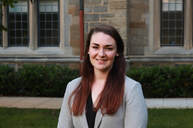
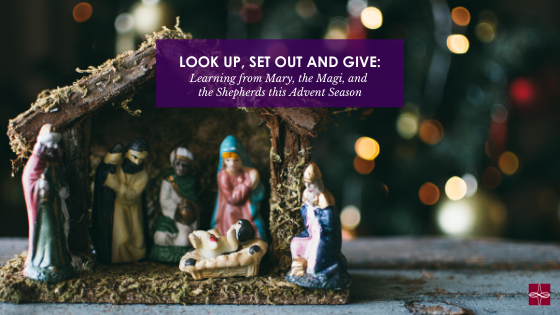

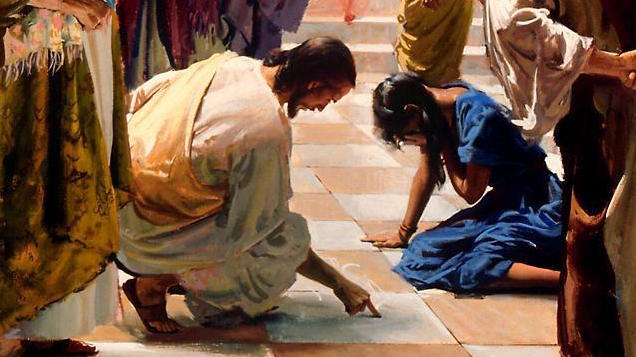
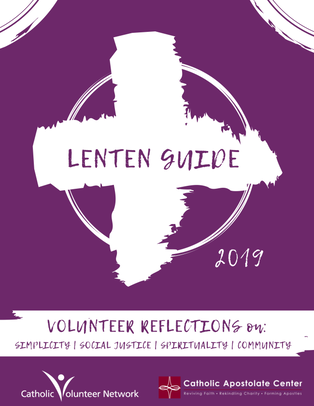
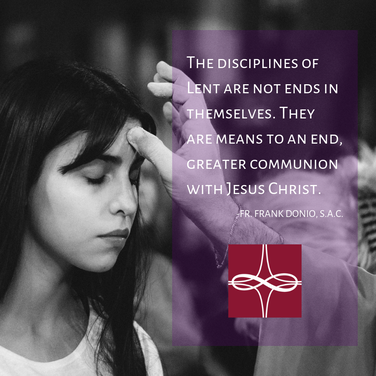
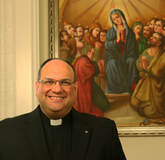
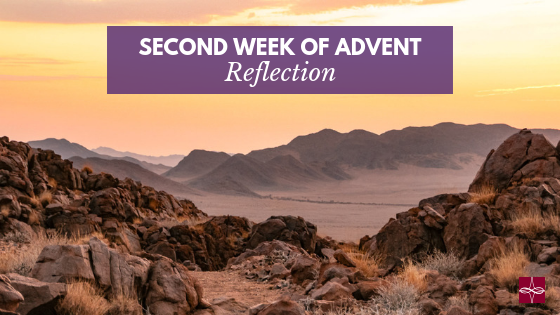
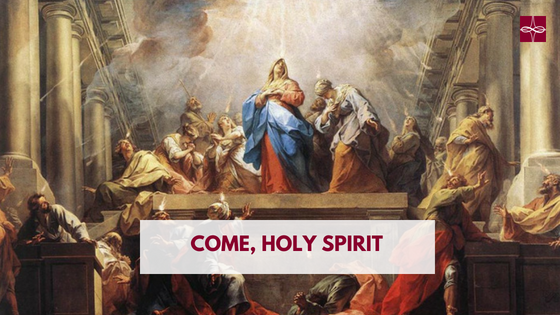

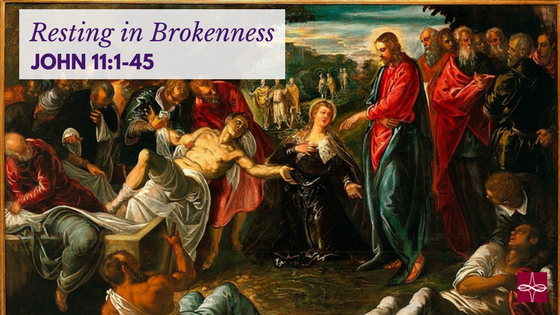


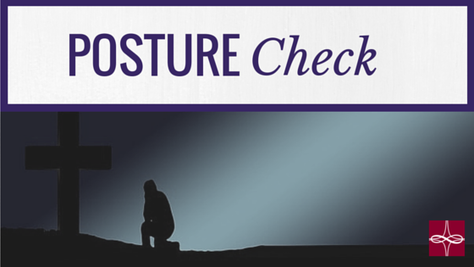

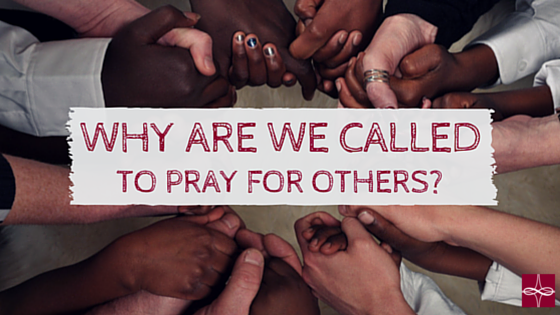


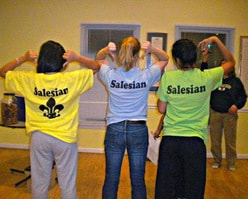

 RSS Feed
RSS Feed